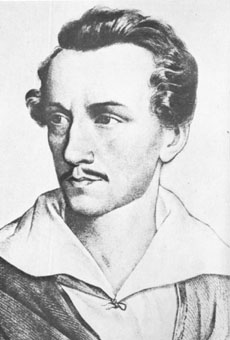Prominent Poles
Juliusz Slowacki, poet

Born: September 4, 1809, Krzemieniec, Russian partition of Polish-Lithuanian Commonwealth (presently Kremenec, Ukraine)
Died: April 3, 1849, Paris, France
Summary. Marshal Pilsudski in 1927: : “In the name of Polish Republic I command you gentlemen to carry Juliusz Slowacki’s coffin to the Royal Crypt because he was equal to the Kings. “ The Pope John Paul II again and again quoted Slowacki’s "Posród niesnasków Pan Bóg uderza...".
Early days. His father Euzebiusz Slowacki (coat of arms Leliwa), was a literature professor at the Liceum Krzemienieckie (Krzemieniec senior high school) and- since 1811- at Wilno University. His mother Salomea nee Januszewska was of Armenian descent. After Euzebiusz’s death in 1814 she returned with Juliusz to Krzemieniec. He learned writing, reading, drawing and French. In 1817 she married August Becu, a Wilno University professor of medicine and the whole family moved again to Wilno. In 1819 he started the first grade of junior high (gimnazjum). In 1822, now in the third grade, he saw Mickiewicz for the first time. In 1825- after finishing the Gimnazjum- he started studying political science at the Wilno University. In 1828 he returned to his mother in Krzemieniec where he learned English, read history and painted.
Employment and emigration. In 1829 he was employed in Warsaw at the Government Revenue and Treasury Commission. Słowacki's early work was influenced by Byron and Shakespeare. His work focused on the Romanticism of Northern Europe with the classic tradition of the South. Following the failed November Insurrection 1830 - 1831, he was offered by Czartoryski a job at the Diplomatic Office of the National Government. As a diplomatic courier of the Government, Slowacki left for Dresden and then for Paris, where he settled down.
Poetry. In 1832-6 he stayed in Geneva, where he was greatly affected by the Alpine scenery and wrote “W Szwajcarii” (In Switzerland). While in Rome in 1836, he made friends with Zygmunt Krasinski, one of the few readers who immediately appreciated the value and innovativeness of his poetry. In 1836-37 he travelled to Greece, Egypt and Palestine, and in 1837-38 stayed in Florence. This exotic trip, the mystical experience of the Holy Land and the subsequent studies of Italian literature, painting and sculpture were reflected in Slowacki's poems and dramas of the period, most notably in “Hymn o zachodzie slonca “ including “Smutno mi Boze…”( Hymn at sunset), „Podroz do ziemi swietej z Neapolu”, „Rozmowa z piramidami”, „Poema Piasta Dantyszka herbu Leliwa o piekle”,„Beatrix”,„Cenci.” His poems, such as “Rozlaczenie” (Separation), “Testament moj” (My testament), “Do Ludwiki Bobrowny”, “Grob Agamemnona” (Agamemnon's tomb), “Ojciec zadzumionych” (Father of the plague-stricken) made it to the canon of literature for future generations of Poles, yet were so innovative that the poet's contemporaries struggled to understand them and few, most notably Krasinski, Norwid and Ujejski, expressed appreciation. Unappreciated and fought against by Adam Mickiewicz, he was „discovered” in the era of modernism. He wrote the dramas “Kordian”(1834), “Balladyna” (1834), “Horsztynski” (1835), „Lilla Weneda” (1839), „Mazepa” (1839), „Sen srebrny Salomei” (1843), „Ksiadz Marek” (1843), “Maria Stuart” (Maria Stuart 1839), “Ksiaze Niezlomny” (1844), “Samuel Zborowski” (1845) „Fantazy” (1846). His poem, “Anhelli” (Anhelli), published in 1838, also conveyed an unfavorable image of the emigration as well as a covert polemic with Mickiewicz. Among other poems „Beniowski” (1841) interpreted as Slowacki's ideological and artistic creed, “Podróz do ziemi swietej”, (1844), “Król-Duch” (published partially in 1847). In 1842 Slowacki joined the organization of Andrzej Towianski — a religious and political group involving some important exiles (for example Mickiewicz), based on messianism and the faith in winning Poland’s independence in a short time. In 1844 Slowacki gathered around himself a group of young exiles who shared his ideals, returning to Poznan, a part of Poland (then Prussian partition). He took part in the Wielkopolska Uprising (1848) and on April 27 addressed the National Assembly as they faced military confrontation with the Prussian Army with the words "I tell you that the new age has dawned, the age of holy anarchy." The uprising was crushed. After the uprising he was sent back to Paris by the Prussian police. On his way he visited Wroclaw (then Breslau), where he met for the last time his beloved mother, with whom he exchanged letters for nearly twenty years. He was really a national prophet when he wrote the poem "Papiez Slowianski" (The Slavic Pope) in 1848. However, the poet did not find approval. His poetry, differing from the accepted model of Mickiewicz's poetry, instead of optimism brought negative and ironic opinions about the Polish exiles and their chances to win independence. Slowacki was an inspiration for Przybyszewski, Wyspianski, Tetmajer, Zulawski. Slowacki's works have been translated in full or in part into more than a dozen languages.
This romantic poet and playwright came to be appreciated after his death (due to tuberculosis), for his skill with language and his lyric philosophical approach to reality.
Funeral. He was buried at the Parisian Montmartre cemetery. In 1927, on the order of Marshal Pilsudski , his ashes were brought to Poland. A boat carrying his coffin sailed along the Vistula river from Gdansk to Cracow stopping at various river ports where local population paid homage. When it reached Cracow in June a funeral ceremony took place on the Wawel Castle courtyard. Marshal Pilsudski who participated in it said: “In the name of Polish Republic I command you gentlemen to carry Juliusz Slowacki’s coffin to the Royal Crypt because he was equal to the Kings. “
This article uses, among others, material from the Wikipedia article "Juliusz Slowacki" licensed under the GNU Free Documentation License. :
Wikipedia
Supplemented by the material from other sources
UMCS
Adam Mickiewicz Institute
Some of his works online (in Polish):
Univ.Gdanski- wiersze
Kordian
Ojciec zadzumionych
English translations of some of his works:
Constance J. Ostrowski
Return to home page:
Prominent Poles
